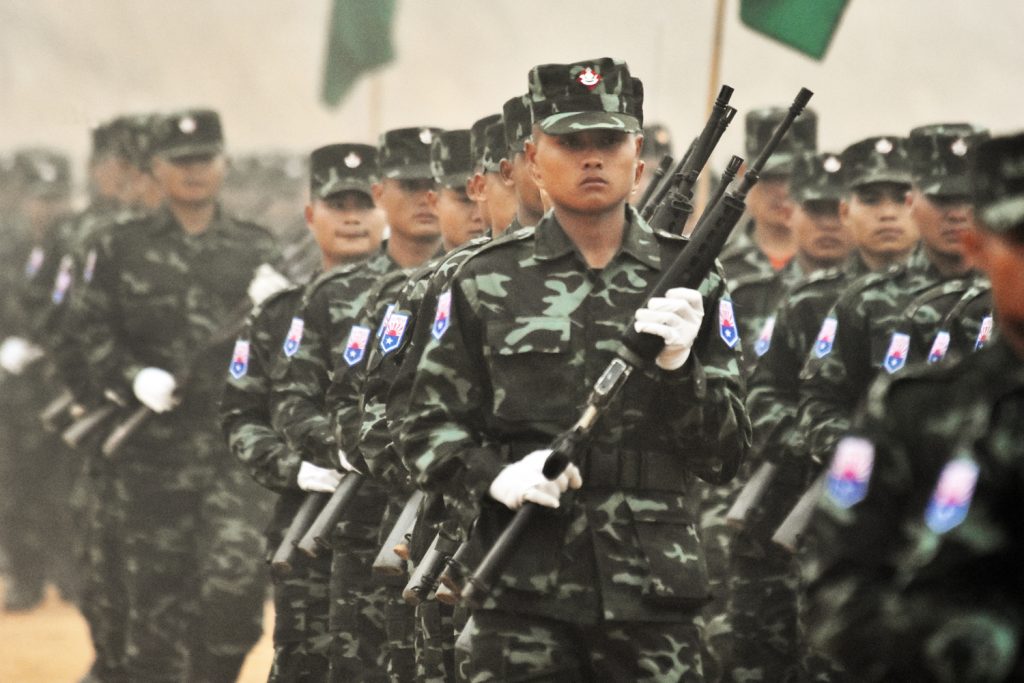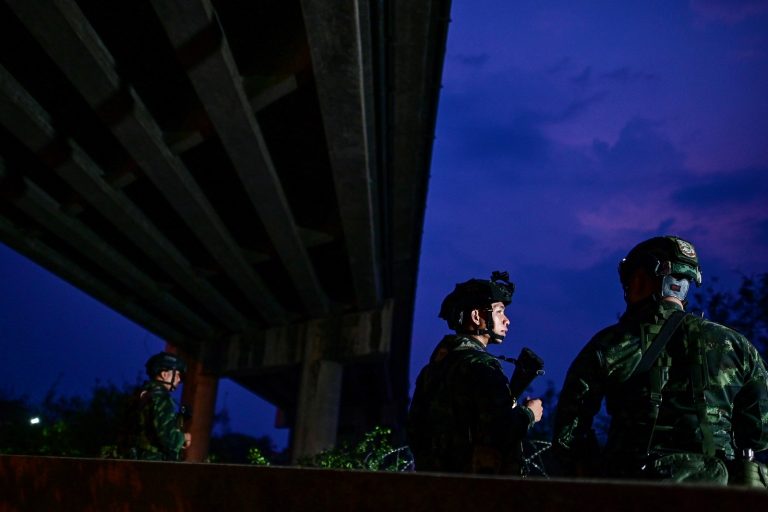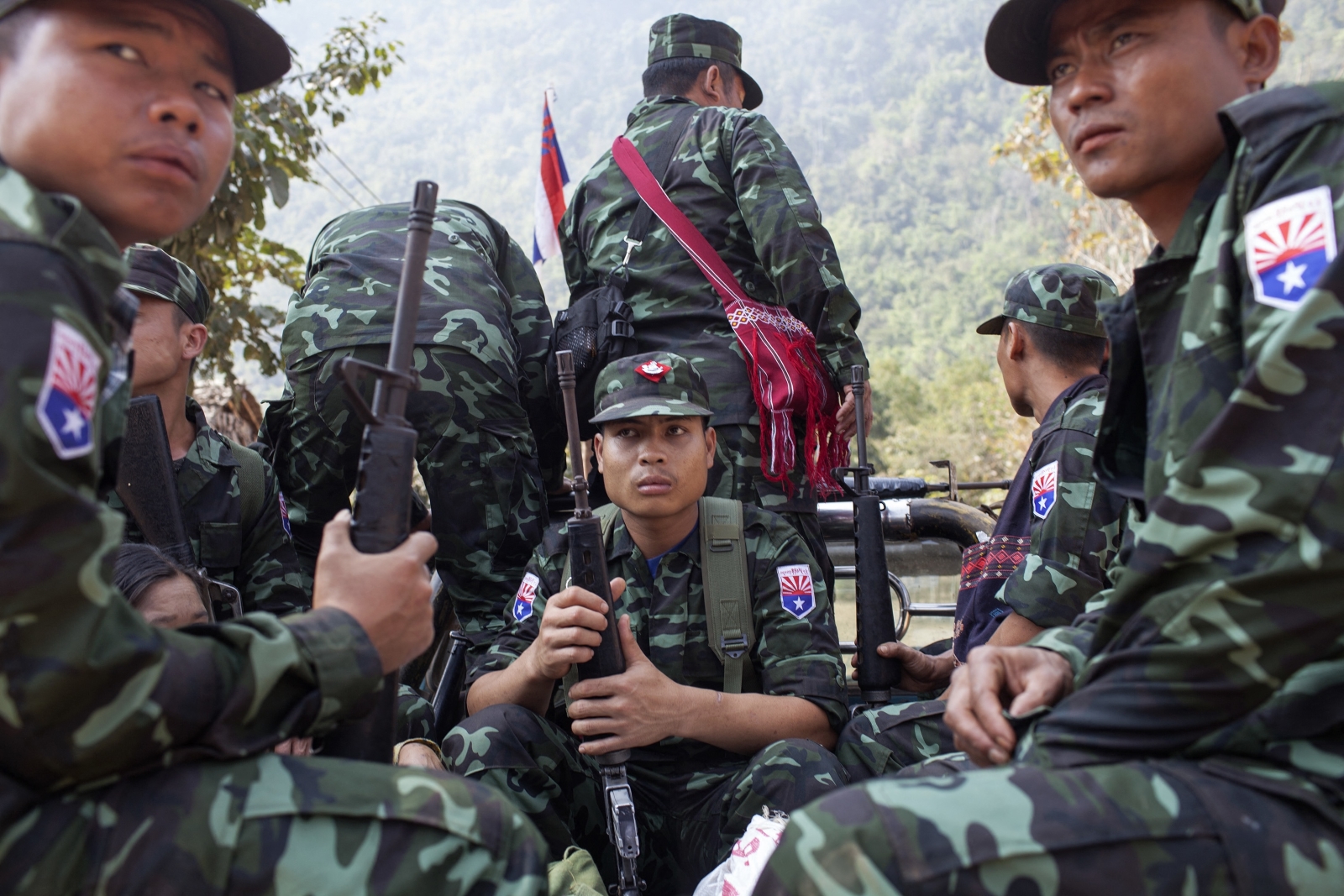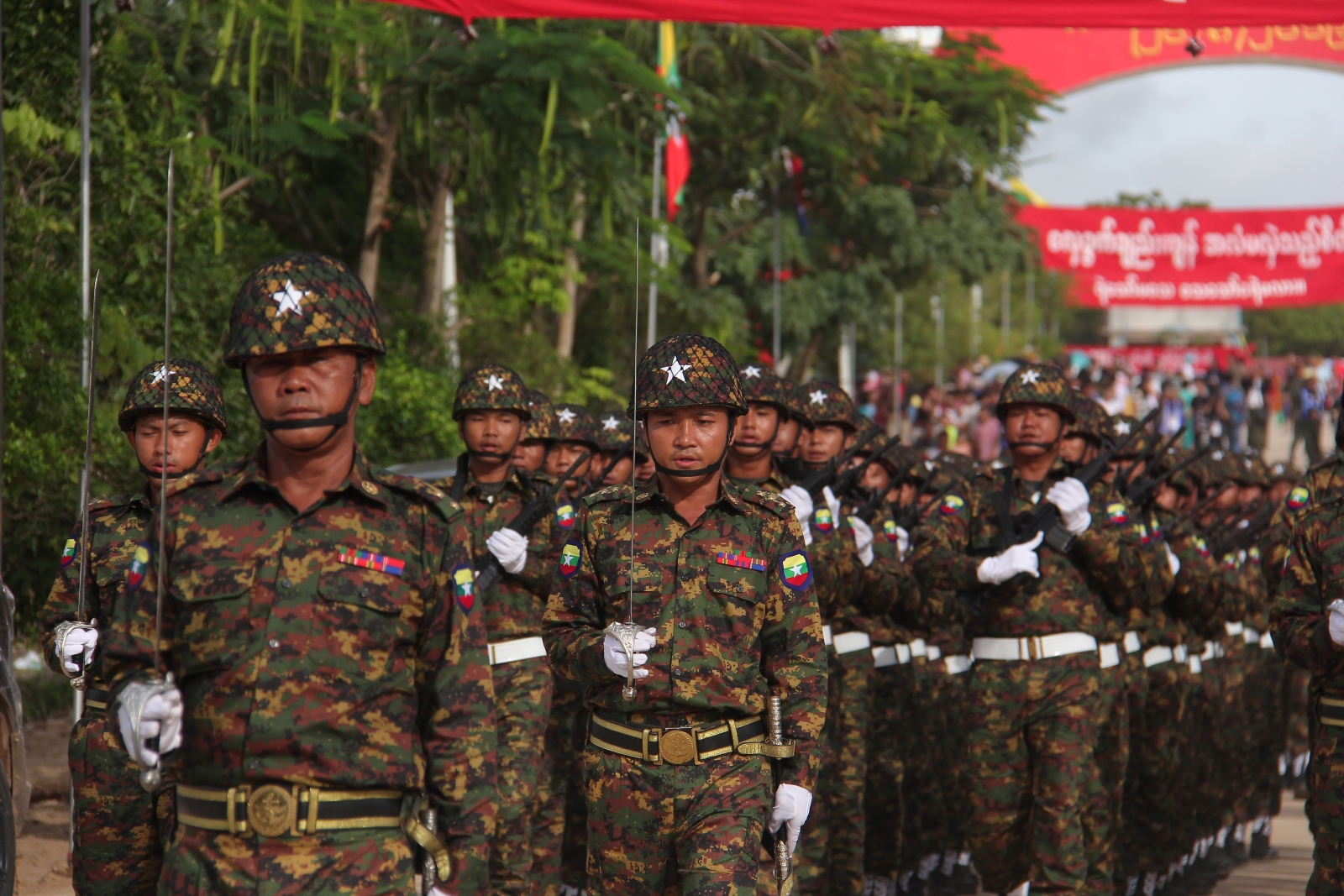The coup has exposed fractures in the Karen National Union, with high-ranking members publicly disagreeing on how involved the group should be in anti-military resistance. An upcoming congress could determine the direction of one of Myanmar’s most influential ethnic armed groups.
By FRONTIER
When the military seized power in a coup in February of last year, the Karen National Union was one of the first ethnic armed groups to signal its opposition and throw support behind the anti-regime movement.
“The Tatmadaw’s seizure of power severely hampers the democratic transition and shows a lack of solemnity in the process of solving political problems through political means,” the group said in a statement the day after the coup. As mass demonstrations broke out across the country, soldiers from the KNU’s armed wing, the Karen National Liberation Army, were pictured providing security for peaceful protesters in its territory.
As the military ramped up arrests of dissidents, many sought refuge in KNU territory. And when protests morphed into armed revolution, the KNLA reportedly trained members of new guerrilla resistance groups, many of which are known as People’s Defence Forces. The KNU came to be seen as one of the most stalwart allies of the anti-regime movement, but not everybody in the organisation seemed ready to embrace this role.
On May 10, KNU Chairman Padoh Saw Mutu Say Poe rejected armed revolution, saying the KNU “will uphold the principle of resolving conflicts via dialogue” and continue to honour the Nationwide Ceasefire Agreement, which it signed in 2015. Padoh Saw Shwe Maung, chairman of Dooplaya District, which is controlled by KNLA Brigade 6, instructed his subordinates “not to accept PDF fighters” into their territory.
Despite this, cooperation between the PDFs and KNLA only appears to be deepening. PDF training has taken place in every brigade, including Brigade 6, and the Karen armed group regularly fights side-by-side with the new resistance forces. The KNU, meanwhile, has begun openly working with the National Unity Government, which was appointed by lawmakers elected in the 2020 polls, most of whom are from the NLD.
A long-awaited KNU Congress, originally scheduled for 2020, may finally clarify the KNU’s official position on the revolution. But chaos in the state, including recent clashes that began in Lay Kay Kaw in Myawaddy Township and have spread to Kawkareik and other areas, continue to delay the meeting.
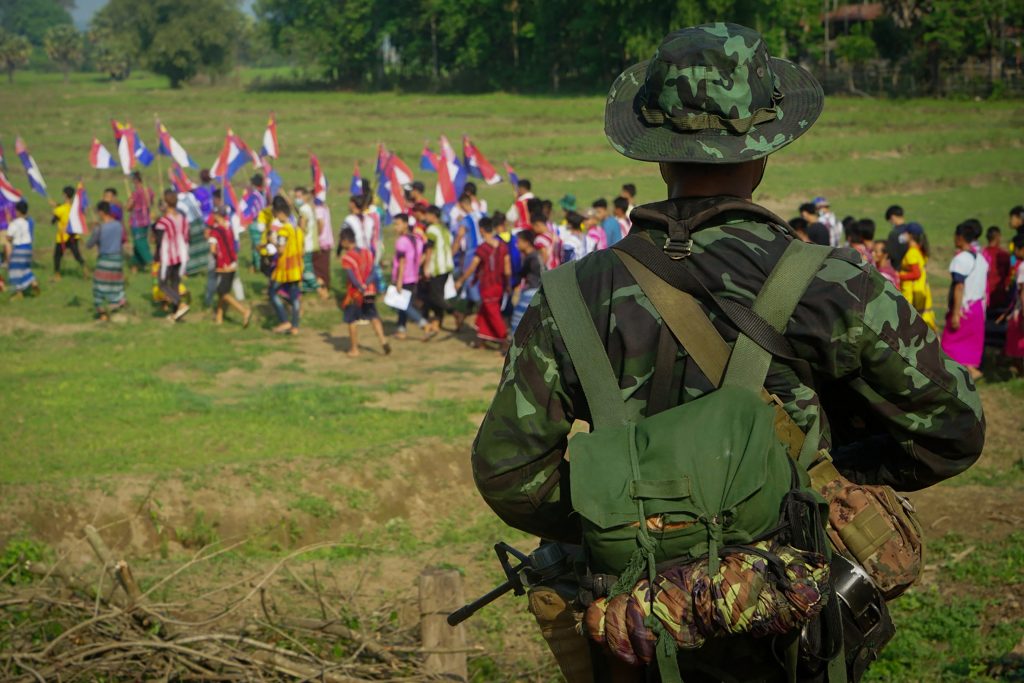
How the Congress works and where it stands
According to the KNU constitution, the congress is meant to be held roughly every four years; it can be rescheduled due to emergencies, but is not supposed to be delayed more than two years. However, no congresses were held between 1974 and 1991, due to the severity of the conflict at the time.
The process can last for a few months – the 16th congress began in December 2016 but only culminated in March 2017, with the selection of the group’s central committee. The 17th congress was originally planned for 2020 but was delayed due to the outbreak of COVID-19 and rescheduled for early 2021. It was delayed again due to the coup; in late March 2021, the KNU’s central committee decided to hold the congress in June, spokesperson Padoh Saw Taw Nee said. But clashes soon broke out in Kayin State, with regime airstrikes displacing some 30,000 people.
“Military and refugee issues are the most important right now, and as the month of the congress approached, it had to be postponed,” he said in an interview with Frontier in July 2021. Taw Nee said at the time there had already been 600-700 clashes between the KNLA and the military, and the instability meant officials from different brigades were unable to safely gather at KNU headquarters.
An unnamed KNU official who attended a meeting with top leadership in November, said the that a decision was made to hold the congress in January 2022. He also confirmed the meeting would address the issue of the NCA. Those who have opposed open confrontation with the regime (and to some extent deeper cooperation with the resistance) have generally cited the NCA, while others in the KNU have claimed that the coup renders the NCA “null and void”.
But in mid-December, Kayin State saw some of its fiercest fighting since the coup. The spark was a military raid on Lay Kay Kaw, in KNLA Brigade 6 territory, in which junta forces arrested dozens of political dissidents, including two elected MPs from the NLD and two police officers who had defected from the regime.
The KNU said its forces were involved in 310 clashes in December, and the fighting – particularly regime shelling and airstrikes – displaced another 50,000 civilians (taking the total displaced in Kayin State since the coup to 80,000).
But the clashes also revealed the true extent of KNU cooperation with the PDFs in its territory. One PDF member, who spoke on condition of anonymity, confirmed that his group had fought alongside the KNU during some of these recent battles in December. He said the junta had suffered heavy casualties due to inexperience in the area, prompting it to rely more heavily on airstrikes.
“About 80 members of the military council were killed in the clashes,” the PDF fighter said, claiming the dead included eight officers, one of whom was a battalion commander. In its official statement, the KNU said 267 junta soldiers were killed throughout the month of December, with another 184 wounded.
The latest fighting has forced a delay to the selection of the central committee, and while the KNU leadership say they expect the congress to be held in February, the situation remains unstable. “In general, all the delegates from the district-level are expected to be ready by the end of January after the vaccination of COVID-19, so we can say that we are ready to convene the congress in February,” Taw Nee said on January 8.
But the fighting is also expected to have internal consequences, with many observers anticipating the clashes will embolden those who favour a more aggressive position against the military – such as by renouncing the NCA and working with the NUG more openly – and forcing those who had been trying to hedge their best to take a harder line against the junta.
According to the KNU Constitution, the congress elects leaders at four levels: village, township, district and central. Members of the general population vote for village-level representatives, while the district and township level officials are elected by the newly elected village administrators and KNU members. These officials and KNU members then vote for central committee members, although some officials are automatically entered into the central committee without a vote, namely brigade leaders and district chairpeople. A total of 55 people sit on the central committee, 14 of whom are directly appointed and 41 of whom are elected.
“Congresses from the village level to the district level last from one and a half months to two months. The final election for the central committee takes just one day,” said Saw Taw Nee.
While the central committee congress has been repeatedly delayed, some meetings have already been held to appoint new village administrators. For example, in April 2021, community-level meetings were held to appoint administrators in villages in Win Ye Township, Dooplaya District, said Padoh Mansha Htoo Wah, a member of the Win Ye Township Election Committee.
(Dooplaya District is also known as Kawkareik district, while Win Ye Township is also known as Kyainseikgyi Township).
“Since the beginning of April, we have been holding meetings in villages in Win Ye Township and re-appointing village administrators. By the end of April, about 30 new village administrators have been appointed. There are 40 villages in Win Ye Township,” said Mansha Htoo Wah.
As with the central congress, however, the process was disrupted by fighting. Mansha Htoo Wah said village-level elections were suspended before completion, as villagers were evacuated to avoid airstrikes by the military.
“Even though new village administrators have been appointed, almost all of the appointed village administrators and villagers have fled the war and it means that the process of the congress doesn’t work yet,” he said.
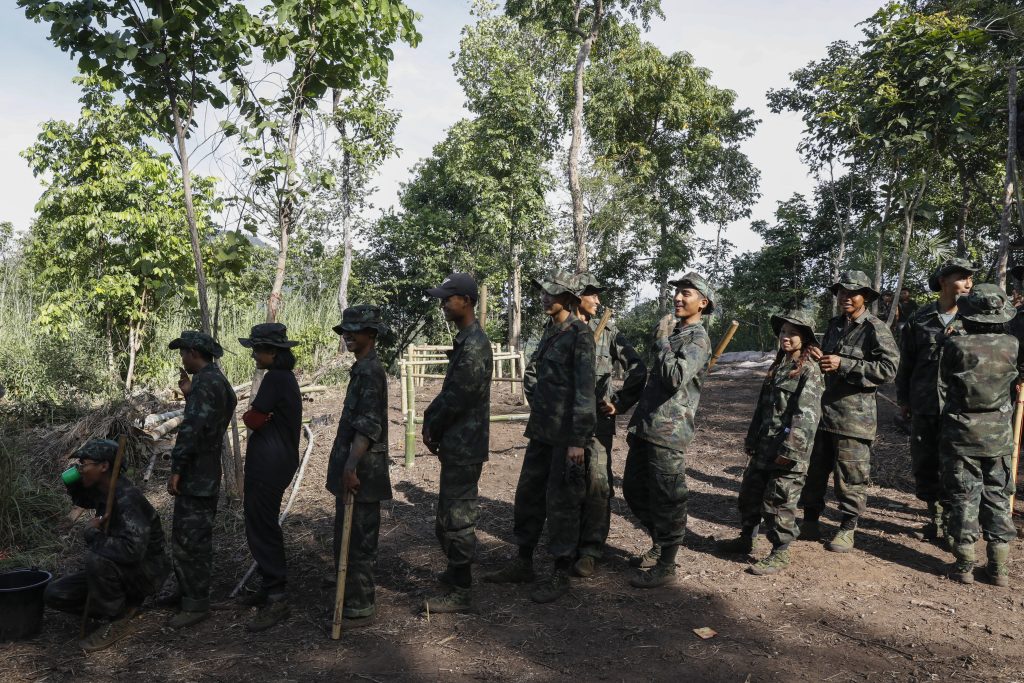
Cooperation with the NUG
In the aftermath of the coup, many anti-coup activists and protesters, government employees participating in the Civil Disobedience Movement, politicians and other dissidents targeted for arrest by the junta fled into KNU territory. Others have also recently arrived seeking military training to take the fight up to the junta.
Many of the activists are affiliated with the National League for Democracy, which was overthrown by the coup, or are loyal to the NUG.
KNU spokesman Taw Nee said he is working with the NUG by serving on the National Unity Consultative Council as a representative of the KNU. The NUCC was established to give a wider range of stakeholders in the anti-regime movement – including ethnic armed groups and ethnic political parties – a voice in political decision-making. But there have been reports of friction between ethnic representatives and those linked to the NLD.
Political analyst Mr David Mathieson said prior to the coup, there was “widespread mistrust” of NLD leader Daw Aung San Suu Kyi, in addition to mistrust of the military.
“The NUG should demonstrate more cooperative spirit, and genuinely work as partners within the NUCC moving forward,” he said, warning that the KNU would “likely bristle at any attempts by the NUG to boss them around” or if the PDFs “act against the interests of the Karen security establishment”.
“An innate dismissively arrogant attitude which infuses NLD political culture has to be excised immediately,” he said.
Mr Kim Jolliffe, an analyst of politics and security in Myanmar, said regardless of the results of the congress, the KNU will likely continue to oppose the coup, provide asylum to dissidents and work with PDFs. “The extent to which the KNU works with CRPH and NUG depends largely on the attitude and actions of the CRPH,” he said, referring to the Committee Representing Pyidaungsu Hluttaw, the group of MPs – mostly from the NLD – who won seats in the 2020 election and appointed the NUG cabinet.
The KNU has concerns about collaborating with the NUG, such as fears of losing control or management over its territory. Taw Nee said the KNU considers itself a “partner” to the NUG rather than under its authority.
“We want mutual recognition and respect for the existence of territorial integrity,” he said.
Ethnic Karen analyst Saw Kapi, from the Salween Institute for Public Policy, agreed that the KNU would likely desire to cooperate with the NUG “on the basis of equal partnership and mutual respect”, but that historical grievances remain.
“Perhaps the NUG, whose members predominantly are the NLD MPs, have some answering to do before they can get full and unequivocal cooperation from experienced revolutionary organisations such as KNU,” he said.
This lack of trust is evident in the comments made by KNU leaders that have not embraced the NUG. In his statement in May warning against cooperating with the NUG and PDFs, Dooplaya district chairman Shwe Maung said Karen people “should avoid being taken advantage of under the current political climate.”
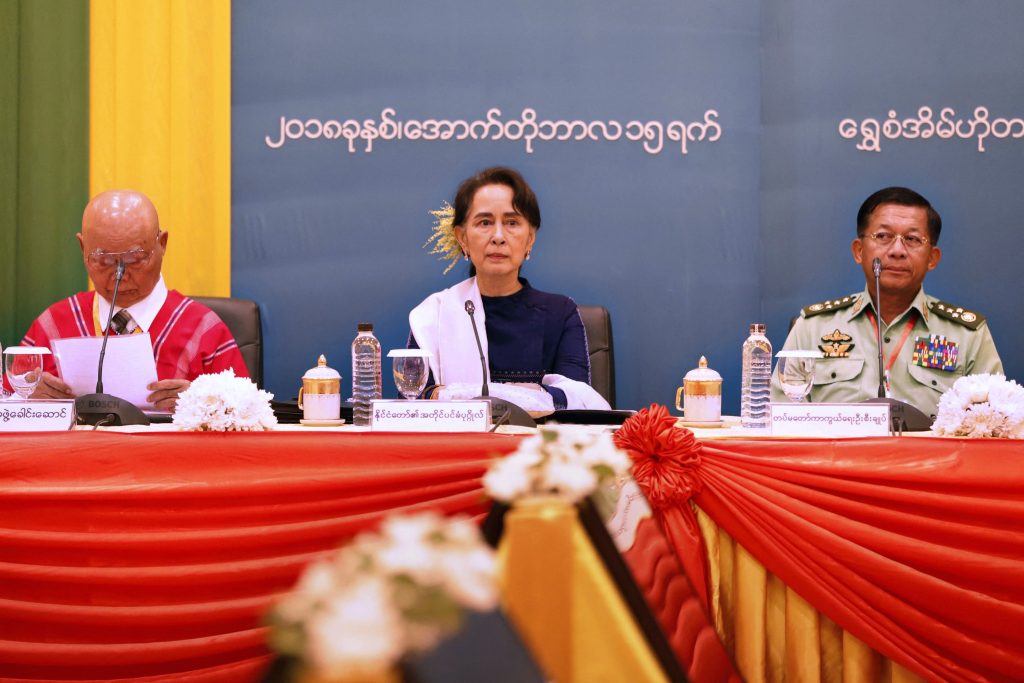
A change in leadership?
The KNU experienced a similar period of internal turmoil between 2012 and 2015, when its leadership debated whether to join the NCA in the first place.
Mutu Say Poe, who was elected chairman during the 15th KNU Congress in 2012, supported signing the NCA, while vice-chair Naw Zipporah Sein opposed it. After the NCA was signed in 2015, the next KNU Congress consolidated power among ceasefire supporters: Mutu Say Poe was re-elected, while Zipporah Sein was not, and almost all senior positions went to NCA backers.
“We criticised the NCA at that time because the NCA was not nationwide,” Padoh Saw David Tharkapaw, another former KNU vice-chair, told Frontier.
He said the NCA undermined the KNU’s mission and provided no benefits to the Karen cause.
“This is just the military’s strategy to control the ethnic armed forces through the government. Despite the NCA, the military is building roads in KNU areas. They are invading in various ways,” he added.
It is not yet clear whether members of the anti-NCA faction of the KNU will attempt to stage a comeback at the upcoming party congress, but if they did, this would likely indicate a shift by the KNU towards more openly embracing conflict with the military.
Jolliffe acknowledged Mutu Say Poe may have “lost some support over recent statements that were ambiguous in relation to his position on the coup”. However, he said that despite some public disagreements, the KNU leadership is actually “more united than it has been in a very long time” because of the coup.
“[K]ey figures from all factions know that Min Aung Hlaing has no interest in real political dialogue, democracy or federalism, so there is no space for political relations with SAC,” he said.
“Whether or not you run in the election depends on the situation,” said David Tharkapaw. “If a pre-congress meeting is convened, we will attend… Whether we have a place or not, the current path of the Karen revolution will not slow down. The military has seized power. In such a situation, if [the KNU] continues to follow the path of the military NCA, we will have to stand up for ourselves,” he said.
A KNU member who supports the anti-NCA faction said they hoped it would return to power. “We have high hopes that strong, decisive political leaders will return through this congress instead of some weak central committee members still considering talking about the NCA and going with the NCA peace process,” they told Frontier.
Mathieson said there’s a “we told you so” attitude within the anti-NCA bloc.
“It’s hard to predict how KNU congresses will go, but I don’t think even the most ardent NCA supporters have much evidence for continuing to support the process under current circumstances,” he said. “That means the belligerent Brigade 5 faction may win out in this year’s congress if it is conducted,” he added, referring to the brigade which has clashed the most frequently and intensely with the military in recent years.
Jolliffe said Mutu Say Poe still has the trust of many local leaders but is getting old and could be replaced by one of his deputies, like KNU vice-chair Padoh Saw Kwe Htoo Win or general secretary Padoh Saw Ta Doh Moo. “Ta Doh Moo in particular took an increasingly strong posture against government and Tatmadaw at peace negotiations before the coup and so is no longer seen as a straight forward NCA supporter,” Jolliffe said.
“There are still significant blocs who distrust the judgment of the leadership group, however,” he added, saying this could create an opening for figures like Zipporah Sein or Padoh Saw Mahn Mahn, a former joint secretary for the KNU who is now the spokesman for Brigade 5.
Kapi declined to “guess” whether the congress would result in a change of leadership, but said there may be more complexity to the positions of the leaders who have continued to stand by the NCA. The KNU leadership knows that the military is violating the NCA “both in spirit and in practice”, he added.
“Some people might want to hear the KNU openly denounce the NCA, but they don’t even need to do that because the SAC is already breaking all the agreements in that document,” he said,
In a sign that the recent fighting in Lay Kay Kaw is influencing even those who previously defended the NCA, KNU chairman Mutu Say Poe broke somewhat with his previous statements during a speech on December 31.He said the KNU’s efforts to build peace were “in vain” after the military seized power.
“As long as there is no political will to resolve political issues in the right way and in the right spirit,” he said, “genuine political dialogue and efforts to build internal peace will not succeed.”
Correction, January 24: this article has been amended to correct the dates when the KNU did not hold a congress, and the number of officials elected versus directly appointed to the KNU’s central committee


